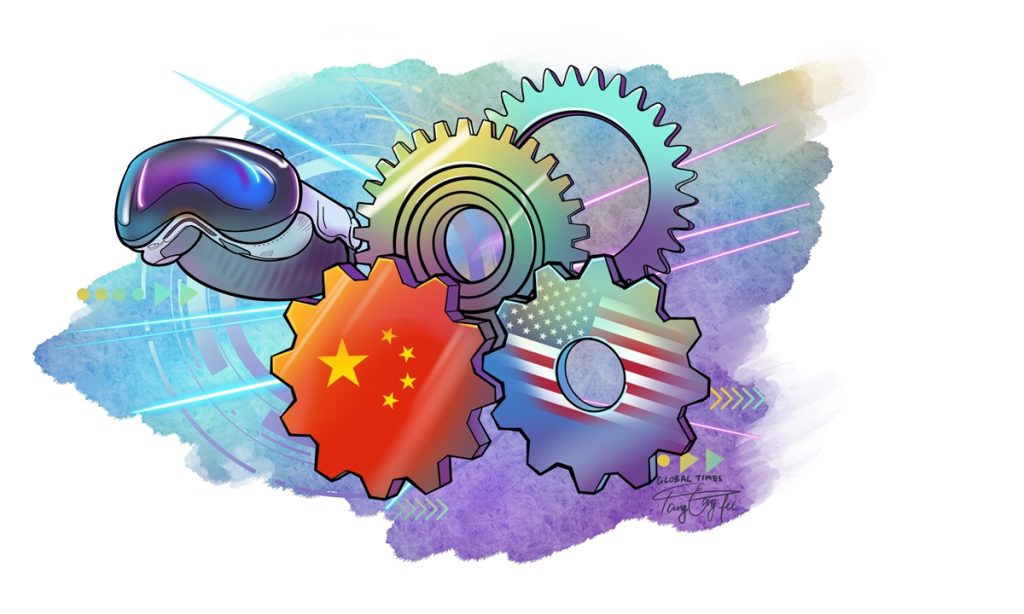China irreplaceable in production of Apple’s long-awaited Vision Pro

Apple's long-awaited mixed-reality headset, the Vision Pro, is a hot topic in the tech world ahead of its coming debut at the US Apple Store on February 2. Extensive media attention has been drawn to the complex supply chain behind the Vision Pro hardware, with many saying that China's supply chain plays a significant role in its manufacturing. Some industry insiders claim that Chinese mainland companies account for about 60 percent of the supply chain.
Some Western media outlets, which habitually take a biased view of China, have recently published articles suggesting that Apple is likely to move a massive chunk of its production capacity from China to India. It is undeniable that China's labor costs have risen, leading to supply chain restructuring. However, some Westerners tend to exaggerate the risks faced by China's manufacturing industry and deliberately ignore its positive aspects.
Publicly available information indicates that China plays an irreplaceable role in the production of Apple's most advanced products, such as Vision Pro. Apple has described Vision Pro as a revolutionary spatial computer that seamlessly blends digital content with the physical world. It showcases Apple's latest generation technology.
Although the West has been hyping global manufacturers' reduced dependence on China, it's indisputable that China's manufacturing capacity has still provided strong support for Western corporations, including Apple.
Apple has a big year ahead for new products, but it also faces challenges. The Vision Pro headset is Apple's first new product category since it launched its Apple Watch series in 2015. However, analysts do not expect Apple to generate significant revenue from the Vision Pro, at least in the short term, due to its high price that may deter many potential customers.
As reported, the Vision Pro starts at $3,499 with 256GB of storage, while the 512GB model is priced at $3,699 and the most-spacious 1TB version is priced at $3,899. Whether the Vision Pro's prices will fall after going into mass production will be the key to capturing more market share, especially in China and other developing markets. Many types of smart glasses have been launched in the Chinese market, and most of them are significantly cheaper than Apple's Vision Pro.
If Apple can effectively utilize China's manufacturing advantages and further collaborate with China's supply chain, its competitiveness in mixed-reality headsets will be strengthened. It's highly likely that China's well-established industry chain could help Apple reduce manufacturing costs for its Vision Pro.
It is precisely because of such abundant cooperation opportunities that shares of some mixed-reality companies in the A-share market experienced a surge in recent trading after pre-orders for Apple's Vision Pro began on January 19.
Apple's development in the Chinese market and the upgrading of China's manufacturing industry are mutually beneficial. While Apple enjoys the advantages of Chinese manufacturing and its market, it could also bring opportunities for the upgrading of China's manufacturing industry.
Chinese supply chain companies are favored by Apple due to their flexibility and strength. During the development of prototypes for the Vision Pro headset, they have been able to meet Apple's innovative demands, according to media reports.
Through collaborating with Apple to develop innovative products, the quality and efficiency of China's manufacturing industry upgrading will undoubtedly be greatly enhanced. Apple can stimulate innovation in the Chinese supply chain by meeting the market demand for innovative products, accelerating its innovation and upgrading, and promoting industrial upgrading and transformation. This cooperative relationship will bring more development opportunities and competitive advantages for China's manufacturing industry.
The vast and dynamic market, strong manufacturing industry foundation and continuous innovation momentum in China are compelling reasons for Apple or any foreign company to embrace production in China to achieve sustainable growth.
The New York Times wrote in an article entitled "How China Has Added to Its Influence Over the iPhone" in September 2022 that "the critical work provided by China reflects the country's advancements over the past decade and a new level of involvement for Chinese engineers in the development of iPhones."
For Apple's ambition to develop innovative products and win future markets, it is essential to embrace the accelerated upgrading of Chinese manufacturing.
